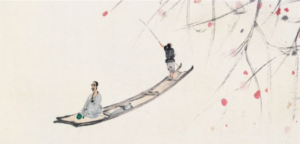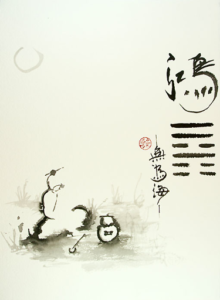Author: Renata Serna Hosie, Director of Methodologies at the Prolongar Foundation
Thoreau said
"Affecting the quality of the day: that is the greatest of the arts"
From time to time I make sure to remember Wu Wei's concept to remind myself that I can allow things to be and unfold in their own way. By evoking it, I allow myself to reduce the effort in the actions I perform, from the smallest to the largest. I remember it in my daily life and I remember it in the workshops we do at the Prolongar Foundation.
The concept of Wu Wei, which means not to do, represents one of the most important principles in Taoist philosophy. It does not refer to a state of inactivity or stagnation and does not imply dispensing with the will or mental activity. Quite the contrary: cultivating non-action is a great challenge, perhaps a paradox?, that of effortless effort. Wu Wei means acting from a place of stillness, stopping to contemplate, being present in practice in a way that allows you to feel without analyzing.

When I remember it in my daily practice, I usually start by silencing myself;
I seek to be comfortable and comfortable and I make sure I am not straining; for example, I go through the muscles that support the shoulders and connect the head, and if I am lying on the ground, I make a micro-movement of the shoulder towards the sky that ends up lying the entire wall of my scapula back on the ground; I reconfirm that there is no muscle tissue suspended or making unnecessary effort; I also recognize what is present in me, what moves and emerges without any intention; I look inside, my anatomy; I like to imagine that I am empty and loose: nowhere to go, but I know, too, that something else will happen.
Perhaps, I like the space of my practice so much because I do not have to apply any formula.
It may not be easy to understand the joy and taste of non-action, for in our Western culture we place great value on action and progress:
"The need to be productive by maintaining a single focus on objectives implies that doing predominates over being, longing over will, complexity over simplicity, artifice over the natural, that analysis replaces reflection and intuition is conditioned by the intention that conditions the action" (Manrique, M. E).
Whereas, in Wu Wei's philosophy, when being prevails over doing, the calmness of the mind is experienced, the attention span is sharpened and this opens the possibility of acting from full consciousness.
Attention is precisely one of the most important psychological processes in the workshops we carry out in Prolongar. Sharpening and expanding the capacity of attention, of focus, means learning to perceive what I do and how I do what I do. Only then can we extend the repertoire of options to choose from (choose what is closest to what I really want or need). Attention allows us to be observers of our experience and when we increase awareness of our own body, we can stimulate the brain and access the capacity for transformation and to be creative. Alejandro Convers, a somatic educator in Colombia, says that "attention is the foundation of presence."

Remembering the concept of Wu Wei in the work we do in Prolong prepares us for one of the great pursuits of the process: reconciliation with one's own life story. Stop resisting, releasing tensions accumulated in the tissues of the body, abandoning the desire to change what was or learning to think about ourselves from multiple and changing identities.
The work we do in the foundation does not aim to change, in the short term, some material difficulties faced by the participants. We do not guarantee them housing, health insurance or a daily meal. But then, as Doralba asked us in the last project, "And what is this for?"
Silencing inside, being aware of the air that comes and goes, noticing the disposition and tensions in the body, recognizing how we are in the moment without wanting to change, is not intended to lead us to see that things are going very well and that everything is perfect, but rather to sustain the present moment with everything that already is. Honor our own life history and the memory archive that we are. The work of self-inquiry and observation that I propose from my experience of Wu Wei and that is almost always a root work and has the quality of the invisible, does not push change, rather allows it to emerge by itself, in times almost always unsuspected. That's effortless effort: it happens when the action performs on its own.
From the beginning of Wu Wei nothing is forced, the execution of the action unfolds beyond all technique, all thought. You may have ever felt the particular weariness that results from imagining, longing, speculating, that things happen in a specific or different way than they are. I do, and perhaps part of that's why every so often I make sure to remind myself that I can eliminate unnecessary effort and use the energy I invest more efficiently. Allowing things to be and unfold in their own way opens up space for me internally and softens my way of being.
References:
Manrique Maria Eugenia. Art, nature and spirituality. Taoist evocations. Editorial Kairós, 2017.
Kabat-Zinn. Mindfulness in everyday life. Paidós. 2009.
Convers Alejandro. Principles of Somatics, 2019.
No comment yet, add your voice below!